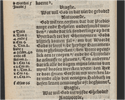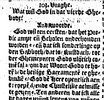Does anyone know the history of the change in Dutch translation within a few years of the German 1563 text (assuming I have this right). It seems the 1563 text of the first Dutch edition is different than the text by at least 1566. And can anyone translate the first one? The key thing I'm looking for is what corresponds to the phrase in 1566 (and subsequently) op de sabbat, dat is op de rustdag ("on the sabbath, that is, on the day of rest”) in the 1563 and any difference in meaning. Sorry for the quality; it's been hard running down early editions online. Note the questions were not numbered in the first edition of 1563.
1563:

1566

1563:

1566

